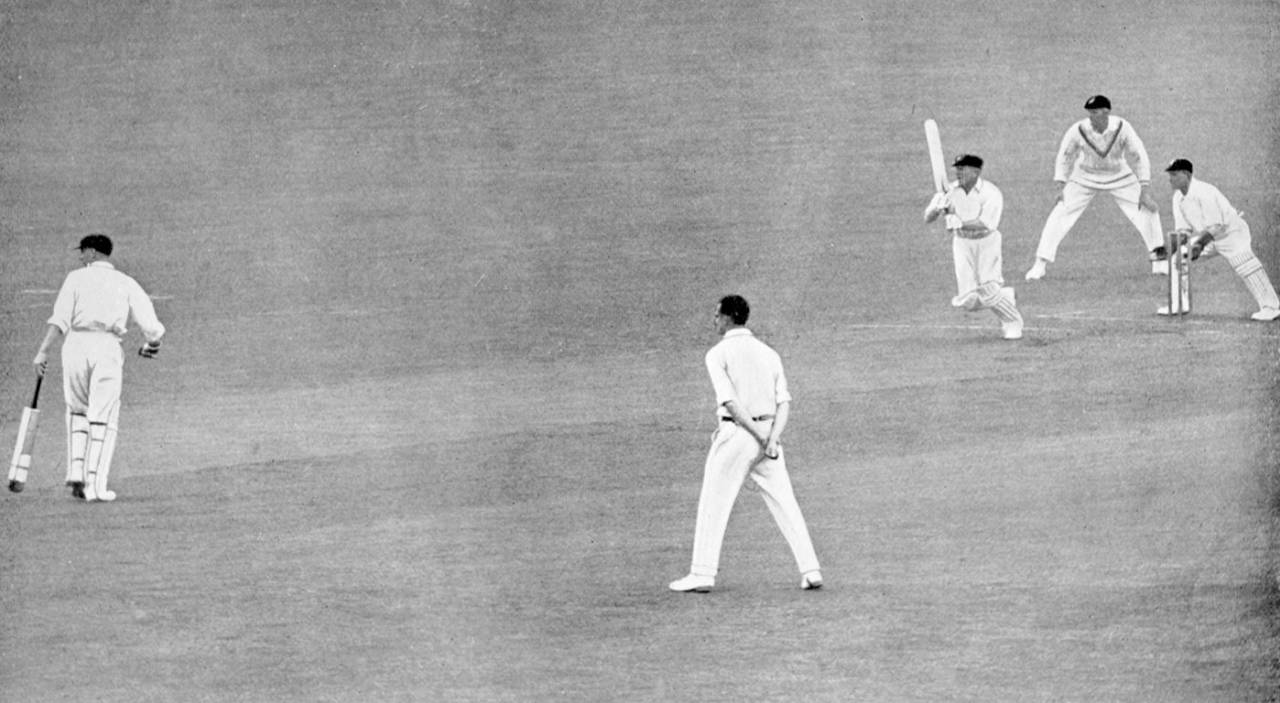Hundred before lunch? Nothing modern about it
David Warner joins an illustrious list that stretches back all the way to the start of the 20th century
Ian Chappell
08-Jan-2017

Working up an appetite: Charles Macartney on his way to a hundred before lunch at Headingley, 1926 • Getty Images
By producing a pulsating innings at the SCG, David Warner became one of only five players to score a century before lunch on the opening day of a Test, and remarkably, the first to do it in Australia.
Despite a vast improvement in bats and the dramatic influence over batting that T20 cricket has had, it was the first time for 40 years that a batsman performed this feat. So much for all those who spout that really aggressive batting has only become fashionable in the last two decades.
In fact there have been many buccaneering batsmen in history but only a rare few with the mental courage to wantonly attack the new ball. The one surprise omission from the list of century-makers before lunch is India's master of mayhem, Virender Sehwag. He had both the mental approach and the opportunity as an opening batsman to score a century before lunch on the first day of a Test but somehow the achievement eluded him.
It happened to be Sehwag who presciently suggested to Warner that he would have plenty of success at the Test level by maintaining his ultra-aggressive T20 approach. Before Warner had played a Test, Sehwag reasoned that with the field up for the new ball, the pint-sized dynamo would find plenty of gaps to pierce with his wide and powerful stroke range.
The player on that illustrious list who it's easiest to imagine Warner having a similar mindset to is Charlie "Governor General" Macartney, who belted his century before lunch in 1926. While padding up for Australia at Trent Bridge against Nottinghamshire in 1921, Macartney is famously reported to have said: "Some cove's going to cop it today."
He was true to his word and scored the second-fastest first-class triple-century by reaching 300 in only 205 minutes. It's easy to imagine Warner thinking, if not saying, something similar as he strapped on his pads at the SCG.
The first man to score a century before lunch on the opening day of a Test was the elegant Australian strokemaker Victor Trumper. He performed his feat in 1902 at Old Trafford after a damp pitch had convinced England captain Archie MacLaren to send in the opposition. Apparently MacLaren said to his team-mates on announcing his decision: "If we keep Victor quiet, lads, we'll bowl the rest out."

David Warner is one of four Australians to have scored a hundred before lunch on the first day of a Test•Getty Images
What makes Trumper's feat even more remarkable is that the scheduled 90-minute session was reduced to 75 by the rain. That night, when MacLaren was chided for his field placings by a few of his mates in a local pub, he replied: "Vic kept hitting them onto the practice field. Did you want me to place fielders out there?"
Not surprisingly, the incomparable Sir Donald Bradman surpassed all others in achieving the feat by repeating the dose in the second session. On the way to scoring a triple-century in a day at Headingley in 1930, Bradman followed his 105 runs in the first session with another 115 before tea. It has often been mistakenly said Bradman scored a century in each session that day, but even he apparently tired, as he scored "only" 89 in the final session to finish the day on 309.
The sole non-Australian to achieve this remarkable feat was Pakistan opener Majid Khan, who pulverised the New Zealand attack in Karachi in 1976-77. However, being the only non-Australian is not what makes the silky-smooth Majid's innings unique. He's the only batsman on that list who hit a six in dominating the opposing attack.
Though he was the first player to score a century before lunch in Australia, in reality Warner was only maintaining a remarkable tradition. All the Australian cricketers to achieve this feat played for New South Wales.
It's no wonder the saying evolved many years ago: "When NSW cricket is strong, so is Australia's." Warner is doing his bit to try to ensure that remains the case.
Former Australia captain Ian Chappell is a cricket commentator for Channel Nine, and a columnist